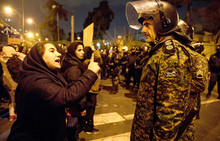Dans des entrevues accordées au Devoir, au National, et à Al Monitor, le doctorant du CEPSI Vahid Yücesoy relate la colère des Iraniens suite à l’écrasement d’avion qui a suscité des manifestations contre le régime iranien partout dans le pays. Le doctorant fait également le point sur la situation géopolitique iranienne et turque.
EXTRAIT : M. Yusecoy rappelle qu’en novembre, la répression de manifestations contre le régime, entre autres liées à la hausse du prix de l’essence, a fait au moins 300 morts selon Amnesty International, et jusqu’à 1000, selon des sources américaines. M. Yusecoy relève qu’au cours de ces manifestations, il n’y avait pas de slogans contre les États-Unis, même si ces derniers maintiennent un embargo économique contre l’Iran.
À lire ici : https://www.ledevoir.com/monde/570710/la-colere-reste-vive-en-iran?
EXTRAIT : Vahid Yucesoy, a specialist in Iranian and Turkish politics at the University of Montreal, said the Iranian-Canadian community feels “frustrated, powerless, and indignant” in the wake of the disaster.
“Many of them had left their homeland in pursuit of a better future in Canada and other countries in the West and were visiting their homeland,” he explained.
EXTRAIT : Despite Turkish and Iranian differences in Syria, “Ankara and Tehran have various reasons to collaborate regionally, especially on the Kurdish issue. This was evidenced by both countries’ common interests in preventing an independent Kurdistan after the Kurdish referendum in northern Iraq. Their lack of trust in the American administration and their common opposition to the Saudi dominance of the region are other factors that are likely to keep the relations afloat.” Indeed, how Turkey will balance its relations with Iran depends much on the health of its continued alliance with Qatar and whether it can mend bridges with Saudi Arabia and other Gulf Cooperation Council (GCC) countries.
